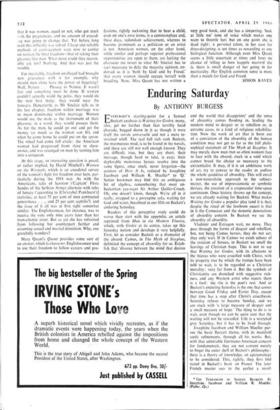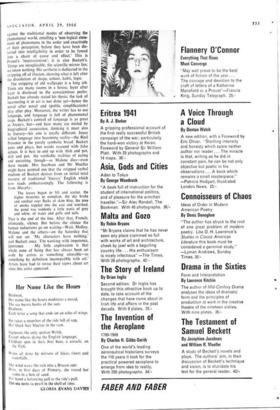Enduring Saturday
By ANTHONY BURGESS
EVERYBODY'S starting-point for a Samuel Beckett anabasis is Waiting for Godot; many, alas, get no further than that terribly lucid charade, bogged down in it as though it were itself the merde universelle and not a mere re- strained whiff. The real full rich rank Beckett, the murmurous mud, is to be found in the novels, and these are still not well enough known. They are difficult, true, but they are short; their message, though hard to take, is easy; their deplorable monstrous heroes resolve into the same figure, once smelt, never forgotten—the quidam of How It Is, reduced by Josephine Jacobsen and William R. Mueller* to 'Q.' Senior bookmen may find this an ambiguous bit of algebra, remembering that most un- beckettian yea-sayer Sir Arthur Quiller-Couch. Oh, one doesn't know, though. We're all in it really, strapped to a porcupine sofa, waiting for God and water, becalmed in our filth on Beckett's enduring Saturday.
Readers of this perceptive study could do worse than start with the appendix, an article reprinted from Man in the Modern Theatre, which, with Godot at its centre, takes up this Saturday notion and develops it very helpfully. First, let us consider Beckett as a dramatist of the absurd. Camus, in The Myth of Sisyphus, delimited the concept of absurdity for us. Estab- lish that 'divorce between the mind that desires and the world that disappoints' and the sense of absurdity comes flooding in, leading the modern mind to despair or to rebellion or, in extreme cases, to a kind of religious rehabilita- tion. Now the work of art that is born out of a conviction of the absurdity of the human condition may not get so far as the full philo- sophical statement of The Myth of Sisyphus. It may merely show men (not so often women) face to face with the absurd, stuck in a void which cannot breed the choice so necessary to the existentialist. It may, if it is an ambitious work of art, try to convey to the reader or auditor the whole quidditas of absurdity. This will entail a non-naturalistic approach to the subject- matter, the use of impressionistic or symbolic devices, the creation of a crepuscular time-space continuum. Once history throws up the concept, we are already waiting for Beckett. What makes Waiting for Godot a popular play (and it is that, despite the ritual of the lowbrow sneer) is that in it the Camusian and the demotic denotations of absurdity conjoin. In Beckett we see the absurdity of absurdity.
Vladimir and Estragon wait, no more. They pass through the forms of despair and rebellion, but, not being Camus heroes, they do not act; they only wait. If in Camus we catch echoes of the stoicism of Seneca, in Beckett we smell the leavings of Christian hope. This is not to say that Waiting for Godot, with its allusions to the thieves who were crucified with Christ, with its property tree by which the tramps have been told to wait, is to be regarded as a Christian morality: very far from it. But the symbols of Christianity are drenched with suggestive rich- ness, and any Western artist who rejects them is a fool: the rite is the poet's rest. And so Beckett's enduring Saturday is the one that comes between Good Friday and Easter Day, except that time has a stop after Christ's crucifixion. Saturday refuses to become Sunday, and we are stuck with 'a large measure of despair and a small measure of hope.' The thing to do is to wait, even though we can be quite sure that the waiting will not be rewarded. Life is a wretched grey Saturday, but it has to be lived through.
Josephine Jacobsen and William Mueller pur- sue the basic Beckett theme, with its manifold seedy refinements, through all his works. But, with that admirable Germano-American concern for fundamentals, they are not content merely to finger the outer shell of Beckett's philosophy : there is a theory of knowledge, an epistemology to be considered. This, rightly, they first find stated in Beckett's book on Proust. The later French master sees in the earlier a revolt
* THE TESTAMENT OF SAMUEL BECKETT. By Josephine Jacobsen and William R. Mueller. (Faber, 42s.) aoainst the traditional modes of observing the phenomenal world, extolling a 'non-logical state- ment of phenomena in the order and exactitude of their perception, before they have been dis- torted into intelligibility in order to be forced into a chain of cause and effect.' This is Proust's 'impressionism'; it is also Beckett's. Things are inexplicable; the scientific mirror lies; we know nothing. His aesthetic is dedicated to the stripping off of illusion, showing what is left after the dissolution of shape, colour, habit, logic.
The stripping of old wallpaper is a long job. There are many rooms in a house; layer after layer is disclosed to the conscientious peeler. Beckett has already stated his thesis; the task of incarnating it in art is not done yet—hence the novel after novel and (public simplifications) play after play. Moreover, the writer has to use language, and language is full of phenomenal traps. Beckett's control of language is as great as Joyce's, but—and here many are misled by biographical association, thinking it must also be literary—his aim is totally different. Joyce willed language into becoming reality—the Real Presence in the purely symbolic bread. Beckett puns and plays, but words resound with false echoes. It is best to end up with 'dish and pot, dish and pot, the verifiable realities of eating and excreting, though—as Malone dies—even these recede. Mrs Jacobsen and Mr Mueller might have pointed out that the stripped verbal medium of Beckett derives from an initial total mastery of traditional 'literary' English which now reads embarrassingly. The following is from Murphy : The leaves began to lift and scatter, the higher branches to complain, the sky broke and curdled over flecks of skim blue, the pine of smoke toppled into the east and vanished, the pond was suddenly a little panic of grey and white. of water and gulls and sails.
That is the end of the line. After that, French; ultimately, silence. But before the silence the human reductions go on waiting—Watt, Molloy, Malone and the others—on the Saturday that will not set. 'My characters have nothing,' said Beckett once. 'I'm working with impotence,
ignorance. . . My little exploration is that whole zone of being that has always been set aside by artists as something unusable—as something by definition incompatible with art.' Artists have had to revise their views about art since this artist appeared.











































 Previous page
Previous page